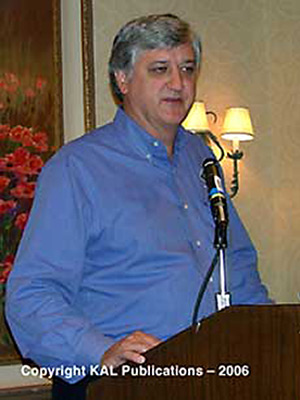There are some pretty powerful forces working against increasing fuel efficiency standards.
If you introduced a new [CAFE] regulation today, it would take about 10 years to effectively replace the fleet of automobiles.

In the old days, the West Coast was basically even on gasoline. There was balance between refining capacity and demand. There was extreme price volatility because we were incident-driven. If something happened, we immediately went from being balanced to being short. So what happened? Anyone who could make our kind of gasoline imported it. If you brought the first few loads of gasoline, you made a lot of money. If you brought one of the last few loads, you didn't. We lived on peaks and valleys as imports would over-correct for a short-time supply situation. Sometimes we had no imports and some times we had a lot of imports.
Is this still the way the West coast works? Nope. The West Coast is chronically short of gasoline. This means we have more stable prices but they're higher prices. Our peaks are just as high — but we have fewer valleys because we're importing all the time.
Prior to 2002, we were giving up 57% of crude oil to gasoline. What made the difference? Taking MTBE out of the fuel pool. To make up for it, imports had to go up. Temporarily, we have had help from Washington State, They had some refinery projects that helped us out. But that is about to go away. They have been showing good demand growth. And California has been showing good demand growth.
We're now importing 8% of our demand into the California-Arizona system.
Since the phase out of MTBE, we have imports coming into this market every single day. Not only that, there has been a change where we get these imports from. Historically, the Far East was where we got those imports from. We're getting a lot now from Europe. The reason for that it is, without MTBE, it is extraordinarily difficult to make California gasoline. Outside of the United States, the most complex refineries are in Europe, so that's where we're looking for gasoline.
The price difference is higher because we lost the valleys, not because we lost the peaks.
We now have cargo all the time on the water. So when there is a capacity problem, we already have relief capacity on the way.
LSD is now continuously short. The price is now set by import parity. We have to have prices that will attract imports in. Before, we used to export diesel. Our price of diesel used to be Singapore minus. Now it's Singapore plus transportation.
Diesel demand on the West Coast is probably the highest demand growth of any diesel with the exception of Far East diesel.
Most of our high sulfur went to South America.
The problem with low sulfur is you have to put it in the same pipeline as home heating oil and jet fuel. On the West Coast, there is no home heating oil in the pipeline.
Pipeline capacity doesn't create new refining capacity. It just robs fuel from the Gulf Coast. This means the East Coast will be short which means they will import more from Europe which means that the import parity will just go up.
Gasoline imports have really dried up from the Far East. It's really impossible for them to make CARB gasoline without MTBE. And it makes no sense to import from China because China has becoming a black hole for sucking in anything with a hydrocarbon.
Any sophisticated refinery can make some U.S. product. But the price has to be high to make it worthwhile. We saw some of that last year [during Hurricane Katrina and the hurricane season]. We got imports from Estonia and Latvia and we've never gotten imports from there before.
The ultimate solution to the problem is building refineries. But you're talking about steel, concrete and engineers. And if you look worldwide, all three resources are extremely constrained.
If you started to build a refinery today, you'd be lucky to have it done in 7-8 years.
Jet fuel is the last of the true commodities. Jet fuel is the same in Singapore as Europe as here.
Trade magazine publishing featuring a “hometown paper” approach to industry news, events, and the people who make it all happen.